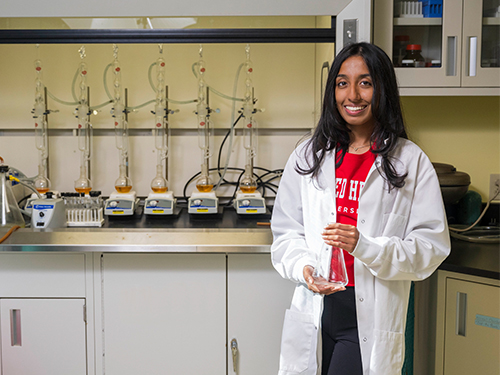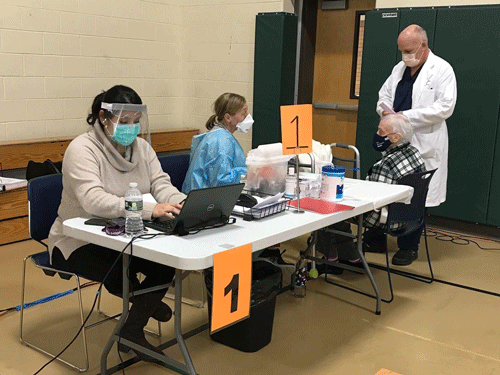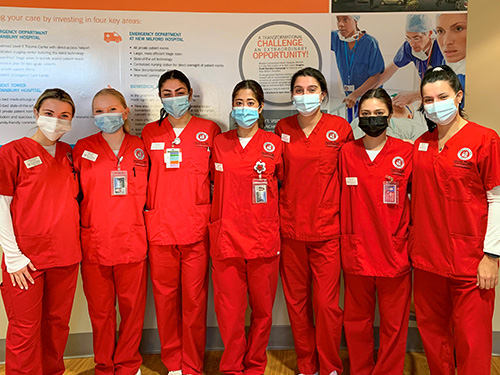
SHU Medical Reserve Corps
In This Section
In This Section
Join a national volunteer initiative in support of public health.
Sacred Heart University’s Medical Reserve Corps Unit (MRC) unit was originally established in 2012 in the Davis & Henley College of Nursing by Linda Strong, Ed.D., RN. Today, the SHU MRC is an interdisciplinary effort that includes leadership from the Colleges of Health Professions and Nursing and volunteers from across the university. The SHU MRC is proud to be the only college-based MRC unit in Connecticut and one of only 15 university-based MRC units across the United States. The SHU MRC aligns with the Sacred Heart University mission to promote social justice and encourages students, faculty and staff to respect the dignity of every person, promote the common good and serve others.
What is the Medical Reserve Corps?
The Medical Reserve Corps (MRC) is a national network of volunteers organized locally to improve the health and safety of their communities. It is under the auspices of the Office of the Assistant Secretary for Preparedness and Response | U.S. Department of Health and Human Services.
The MRC program provides a structure to pre-identify, train, credential and organize medical and public health professionals, as well as non-clinical volunteers to supplement and support health emergency response systems. MRC units engage these volunteers to strengthen public health, improve emergency response capabilities and build community resiliency.
The mission of the SHU MRC is to develop and coordinate a network of volunteers who will support Connecticut Department of Emergency Management and Homeland Security (DEMHS) Region 1 efforts.
Why should I get involved in the SHU MRC?
Benefits of joining the MRC include:
- Volunteer service as a SHU student provides personal reward and may count towards volunteer hours for your program
- For students in health care programs, MRC volunteer experience may be used for clinical hours (with permission) and looks favorable on applications for advanced degree programs
- Gain hands-on experiences similar to your chosen career track–having this early exposure can broaden your skill-set for your future career
As a newly declared health science major, I wanted to learn more about health and wellness in the context of the real world and our local communities. Volunteering at the mass vaccine clinics held on campus allowed me to experience global pandemic response, something that my generation hadn’t yet experienced, firsthand. I’ve learned that emergency preparedness is better understood through directly assisting in these relief efforts than through a book or lecture. SHU MRC has afforded me numerous life changing opportunities, from building new connections in the healthcare field, to discovering my passion for health equity. You don’t need to be a medical professional to be a part of SHU MRC, but rather someone who wants to help people in a time when they need it most.
What do volunteers do in the SHU MRC?
Volunteers are at the very heart of the SHU MRC. The existence of this nationwide, community-based movement is due to the willingness of volunteer medical and public health professionals to serve their communities in times of need. Without that generous offer of service, there would be no MRC.
Depending on the nature of the emergency, members may have clinical and non-clinical roles. Potential activities include, but are not limited to taking medical histories, administering vaccines or medications, answering a hotline or providing behavioral health support. Non-clinical staff may register clients, assist with supplies and equipment, enter data or provide other administrative and logistical support.
I volunteered as a vaccinator assistant at COVID-19 vaccination clinics every weekend with the SHU unit of the Medical Reserve Corps. Being able to be a part of helping those receiving their vaccinations has been such a great experience and I have been able to see the evolution of community awareness and knowledge for this population as the weeks have passed. Education has played a key role in helping those feel comfortable prior to receiving the vaccination. As an aspiring physician, it has been extremely rewarding to be a part of this. The MRC is a great organization to volunteer for, especially if you are someone who aspires to have a lifelong career in the medical field. To have this opportunity to promote health and safety while using team building and collaborative skills is truly a privilege.
SHU Medical Reserve Corps learning outcomes
- Disaster and emergency response skills
- Improved public speaking and communication skills
- Teamwork and collaboration skills
- Leadership and management skills
- Knowledge of public policy and public health policy
- Knowledge of Incident Command System
How do I get started?
SHU MRC volunteers (students, staff and faculty) must attend a one-hour online or in-person orientation as well as complete two online training courses through FEMA’s Emergency Management Institute. Volunteers must complete a profile through Connecticut’s volunteer management system, CT Responds. In addition to the initial orientation, all volunteers are required to take IS-100 and IS-700 Emergency Incident Command online training modules. Other trainings may be required for specific roles, as needed.
My experience with the SHU MRC has been rewarding, especially for all volunteers who are willing to help others in a time of need. I volunteered as a vaccinator to combat this chaotic time and to bring a sense of comfort and education so that one day, we can return to a sense of normalcy.
More Information
Norman Weller, MSN, RN
Director
The Latest in SHU Medical Reserve Corps
View More News-
 Community Outreach, Student Spotlight & OutcomesPublished:Sana Mohammad was youngest lead volunteer with city’s VAX Team
Community Outreach, Student Spotlight & OutcomesPublished:Sana Mohammad was youngest lead volunteer with city’s VAX Team -

SHU Activates Medical Reserve Corps to Help with COVID Crisis
Published:Members volunteer on the front lines of the vaccine initiative -

Nursing Students among First to Administer COVID Vaccine
SHU in the News, Student Spotlight & OutcomesPublished:Pioneer spirit brings students to the vanguard of national battle against pandemic




